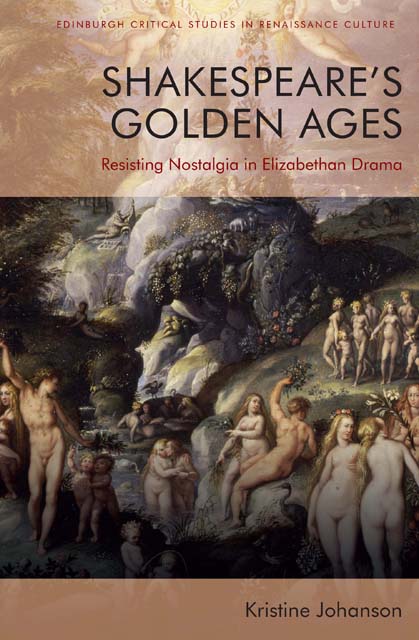Book contents
- Frontmatter
- Contents
- Dedication
- Series Editors’ Preface
- Prologue
- Note on Citation
- Introduction: Rethinking Nostalgia
- 1 Against Nostalgia: Looking Forward to the Future in the Queen’s Men’s Plays and Marlowe’s Tamburlaine
- 2 What Merry World in England? Nostalgic Paroemia and The Second Part of Henry VI
- 3 In the Mean Season: Richard II’s Absent Hospitality
- 4 The Lessons of Nostalgia in Julius Caesar and Sejanus
- Conclusion: Resisting Nostalgia
- Bibliography
- Index
4 - The Lessons of Nostalgia in Julius Caesar and Sejanus
Published online by Cambridge University Press: 18 November 2022
- Frontmatter
- Contents
- Dedication
- Series Editors’ Preface
- Prologue
- Note on Citation
- Introduction: Rethinking Nostalgia
- 1 Against Nostalgia: Looking Forward to the Future in the Queen’s Men’s Plays and Marlowe’s Tamburlaine
- 2 What Merry World in England? Nostalgic Paroemia and The Second Part of Henry VI
- 3 In the Mean Season: Richard II’s Absent Hospitality
- 4 The Lessons of Nostalgia in Julius Caesar and Sejanus
- Conclusion: Resisting Nostalgia
- Bibliography
- Index
Summary
So have I seene, when Cesar would appeare,
And on the Stage at halfe-sword parley were,
Brutus and Cassius: oh how the Audience,
Were ravish’d, with what wonder they went thence,
When some new day they would not brooke a line,
Of tedious (though well laboured) Catilines,
Sejanus too was irksome, they priz’de more
Honest Iago, or the jealous Moore.
And though the Fox, and subtall Alchimist,
Long intermitted could not be quite mist.
With these lines, the poet and translator Leonard Digges (1588–1635) provided posthumous commendatory verses to the 1640 edition of Shakespeare's Poems, lines which echo his earlier laudatory poem for the First Folio and repeat his allusion there to Julius Caesar's ‘parley’ scene. But these later verses specifically add an element of comparison which asserts Shakespeare's superiority as a poet, and which stresses the longing attendant on that superiority. Jonson himself perhaps makes a sly comparison in Epicene or The Silent Woman (1609), when Truewit threatens Morose that a wife may ‘censure poets and authors and styles, and compare ‘em, Daniel with Spenser, Jonson with t’other youth’, where that ‘youth’ may refer ironically to a middle-aged Shakespeare. Historically, such comparison as a method has often either opposed the two playwrights or urged Jonson's reliance on Shakespeare. Percy Allen's wildly speculative 1928 account of Sejanus argues that Jonson modelled his play on ‘his master’ Shakespeare, compared to whom he falls flat; Lynn Meskill more recently argues that Jonson must have felt ‘a threat to [his] authorship’ from the unknown collaborator referred to in his quarto. However bardolatrous (and dated) Allen's claims are, such value judgements can and have created a narrative of one-way influence that doesn't necessarily see exchange or development, only uninspired dependence. Increasingly, however, critics have argued that Shakespeare and Jonson stage a dialogue or, failing that, a set of shared concerns: from Othello and Volpone, to Othello and Every Man in his Humour, to Sejanus's influence on Measure for Measure, King Lear and Coriolanus, ‘there is little proof of enmity and considerable evidence of artistic cooperation’.
Looking closely at Julius Caesar (1599) and Sejanus (1603/05), their material and thematic connections certainly encourage this line of thinking about the plays’ relationship more as a ‘conversation’ than a contention.
- Type
- Chapter
- Information
- Shakespeare’s Golden AgesResisting Nostalgia in Elizabethan Drama, pp. 132 - 164Publisher: Edinburgh University PressPrint publication year: 2022

